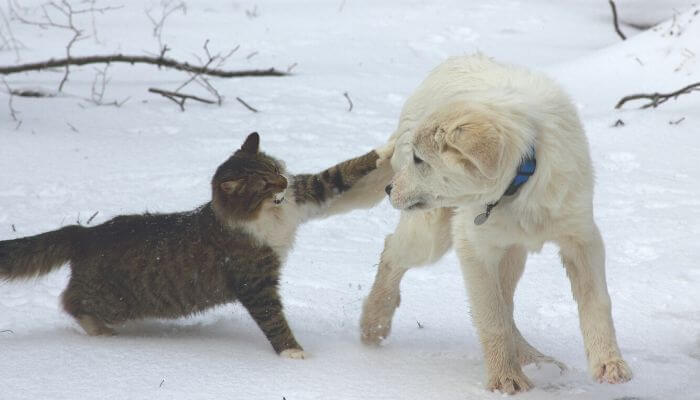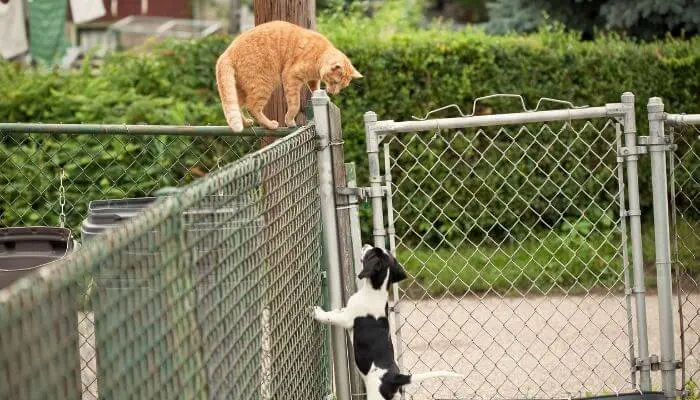It can be frustrating when your cat constantly behaves aggressively towards your dog.
Thankfully there are ways to prevent your cat from attacking your dog:
Why Are Cats Aggressive Toward Dogs?
The rivalry between cats and dogs isn’t new. But, while some furry friends get along famously, others can’t seem to stand each other.

However, your dog and cat can become good friends if you choose the right dog with a good temperament and proper training. It will decrease the conflict between them.
If you’ve ever witnessed a hissing, clawing, and snarling showdown between a cat and a dog, you might wonder why cats are so aggressive toward dogs.
There are a few reasons cats can sometimes turn into little balls of fury when they encounter their canine counterparts. So let’s explore them together, shall we?
Different Communication Styles
When cats and dogs meet, they’re essentially trying to communicate with each other in different languages.
Dogs often rely on body language and vocalizations to signal their intentions and emotions. For example, they may wag their tails, raise their hackles, or bark to convey different messages.

On the other hand, cats are solitary creatures who don’t rely as much on social cues to navigate their environments. Instead, they communicate through scent marking, body language, and vocalizations that can be subtle and nuanced.
To might be confusing or even threatening, leading to an aggressive response.
Understanding can help pet owners navigate these interactions and help their furry friends coexist peacefully.
Territorial Instincts And Survival Skills
Cats are territorial creatures who like to have control over their environment. So when a dog enters a cat’s domain, whether it’s their home or a shared outdoor area, the cat may feel threatened and become aggressive.
It is mainly true for , who may see dogs as potential predators.
Cats are also skilled at protecting themselves from threats. They have sharp claws and teeth that they can use to defend themselves.
Early Experiences And Socialization
Early experiences and socialization can also affect how a cat responds to a dog. For example, if a cat grew up around dogs or had positive experiences, they’re more likely to be friendly to dogs they meet later in life.

Regardless, if cats have had negative experiences with dogs, such as being chased or attacked, they may respond aggressively to dogs.
Besides, some cats have more assertive or aggressive personalities than others. For example, a confident, dominant cat may be more likely to take charge when a dog is present, while a shy or nervous cat may be more likely to hide or run.
Fear And Prey drive
Cats are generally smaller than dogs and may feel intimidated or scared when faced with a larger, more dominant animal. If a cat perceives a dog as a threat, it may become aggressive to protect itself.
Some cats have a strong prey drive and may see dogs as potential prey. This can cause them to become aggressive and lash out at dogs.
Do Cats Attack Dogs For No Reason?
No matter if you are a cat or dog person, it can be alarming when cats attack dogs.
First, it’s important to note that attacks can happen when the cat and dog first meet or even when they’ve been living together for some time. So it’s not always about the initial introduction.
Cats can be quite territorial; they may lash out at the dog if they feel their space is invaded. In addition, if the dog has a high prey drive, it may see the cat as something to chase, which can trigger the attack.
But here’s the thing: every cat is different, and there may be a whole host of reasons why your particular feline is attacking your dog.
Maybe they’re feeling stressed or anxious about a recent change in the household or feel cranky and want to be left alone.
The important thing is to try and understand your cat’s behavior and figure out what might be causing the attacks.
And if you’re still having trouble figuring out why your cat is attacking your dog, don’t hesitate to reach out to a veterinarian or animal behaviorist for extra help.
8 Tips To Stop Your Cat From Attacking Your Dog
Cats and dogs may make for cute cartoons. But when your cat attacks your dog, it can be quite distressing for animals and their caretakers.
Here are ways to stop this behavior and create a peaceful and harmonious home for them.
Understand the Root Cause
Before you can address the issue, it’s essential to understand why your cat is attacking your dog in the first place. Cats are territorial animals, and introducing a new pet into their environment can be stressful.
Your cat may feel threatened or anxious and act out as a result. However, it’s important to understand that this behavior is not out of malice but rather a response to a perceived threat.
Slowly Introduce Them
When introducing pets, it’s essential to take it slow and steady. For a harmonious relationship, you must consider dog breeds that get on well with cats.
Some examples of , Poodles, Labradors, Retrievers, Basset Hounds and plenty more!

Introducing your pets to each other should be done gradually and carefully. Start by allowing them to see and smell each other from a distance, gradually decreasing the space between them over time.
This process can take days or weeks, so be patient and don’t rush it. With a little creativity and supervision, your furry companions can become lifelong friends.
Separate Your Pets
If your cat attacks your dog, it’s best to separate them to prevent further harm. You can achieve this by providing separate living spaces, such as rooms or designated house areas.
You can also use baby gates or pet barriers to keep them apart while allowing them to see and smell each other.
Playtime Is The Key
One of the best ways to help your pets get along is to engage them in playtime. Set aside a few minutes each day to play with your cat and dog using interactive toys like balls or feather wands.
It will help them build positive associations with each other and learn to play together in a fun and non-threatening way.
Give Them Their Own Space
Cats and dogs have different needs and preferences regarding their personal space. Therefore, providing animals with their own space, such as a bed or crate, can help them feel safe and secure.
Ensure these spaces are not too close and each animal has enough room to move and stretch comfortably.
Use Positive Reinforcement
Training your pets to coexist peacefully can take time and effort, but it’s well worth it. Use positive reinforcement techniques, such as treats or praise, to reward good behavior and discourage negative behavior.
This will help your pets learn that good things happen when they behave well around each other.
Keep Them Busy
Boredom can lead to aggressive behavior in both cats and dogs. Ensure your pets have plenty of toys and activities to keep them busy and mentally stimulated.

Puzzle feeders, , and interactive toys are all great options to keep your pets occupied and distracted from each other.
Consult With A Veterinarian
If your cat’s attacking behavior persists, it’s essential to consult a veterinarian. They can help identify any underlying health issues contributing to the behavior and recommend behavioral training or medication if necessary.
You can ask them for recommendations for choosing the most compatible and friendly dog breed.
FAQs
If your cat attacks your dog, separate them immediately to prevent injury. Consult with your veterinarian or a pet behavior specialist to develop a plan for preventing future attacks.
Yes, training can be beneficial in preventing your cat from attacking your dog. Training your cat to respond to verbal cues and good rewarding behavior can help them learn to coexist peacefully with your dog.
The amount of time it takes for your cat to stop attacking your dog will depend on several factors, such as the age and temperament of your pets and the severity of the behavior. However, with consistent training and management, you can expect to see improvements over time.
- How to Perform Dog CPR on Small & Large Pets: Step-by-Step Guide
- The Ρicture Is Quite Heartbreaƙing: Traρρed Cat Was Rescued In The Night!
- A Woman Adopted Three Blind Cats From A Shelter That Have Been Waiting For Their Owners For So Long.
- From Desperation to Renewed Life: The Inspiring Rescue and Transformation of a Suffering Puppy
- After 10 Years Serνing Her σwner, They Did Nσt Want Annie Anymσre, And Thrσugh Her σut Liƙe Garbage

